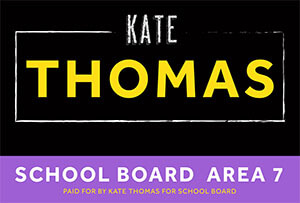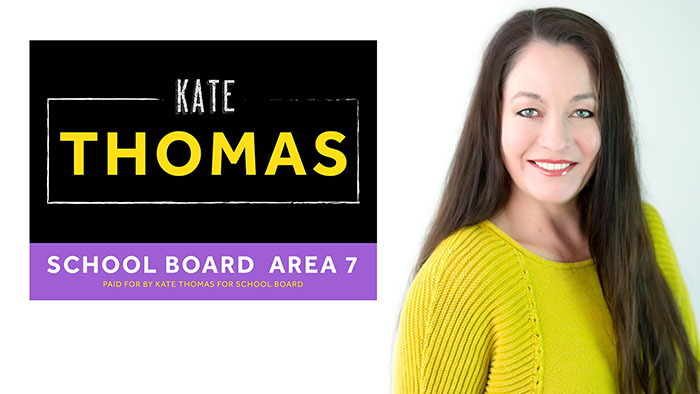MEET KATE THOMAS
DO YOU LIVE IN AREA 7?
MY VIEWS

During my recent role as a Board Member for the RCAS School Board, I’ve learned that fellow parents would like to have more control over what their kids are learning, additionally implementing classes that help our children learn specific skills that set them up for success in this ever changing modern world. For instance, teaching skills within renewable energy, sustainable farming, and coding. Some programs like these have been added to the District Pathways Program.
The Pathways Program, while still in its infancy stage, has been proven it works. I’m very excited to see where this Program goes. During my time on the board, my fellow Board Members and I have worked hard to implement classes that prepare students for the future. One example of a class that is currently taught through the Pathway Program, is Animal Science. The knowledge they gain in this class is launching students into a career path right out of highschool.
Parents need to have a larger voice in deciding the subjects their children are learning. Critical Race Theory, is one subject parents have expressed, subbing out for a class listed above. To streamline communication and solve the misconstruction of concerns with parents, we should implement a parent’s handbook. This handbook can be used as a resource to communicate with parents within the district. The handbook will be one of my top priorities, if elected again.

I began courageous conversations with our superintendent that led to the implementation of the dyslexia work group committee in our district. This work group, led by the director of the special education department, has made good strides in professional development for teachers. It started implementing the South Dakota dyslexia work group’s 5-year plan. Like everything, implementation is a process. It’s so important to have me represent on the board, not just area 7’s students, but all students, and to monitor the ongoing implementation until these students get the appropriate education they deserve.
I would like to see these guidelines:
1. Providing a set of screening for all students, including students demonstrating one or more potential signs of a neurological learning disability including, but not limited to dyslexia.
2. To provide a framework of intervention for students at risk of dyslexia and other learning difficulties that is timely and responsive.
3. To provide a comprehensive resource of evidence-based practices aimed at all educators to support students at risk of dyslexia and those identified as having dyslexia, consistent with and linked to other guidance from the South Dakota Department of Education.
Dyslexia is a specific learning disability that is neurobiological in origin. It is characterized by difficulties with accurate and/or fluent word recognition and by poor spelling and decoding abilities. These difficulties typically result from a deficit in the phonological component of language that is often unexpected in relation to other cognitive abilities and the provision of effective classroom instruction. Secondary consequences may include problems in reading comprehension and reduced reading experience that can impede growth of vocabulary and background knowledge.
Dyslexia can be mild to severe. Most people that exhibit mild symptoms make it through school easily and their dyslexia may never be noticed. This is even possible for moderate exhibits, but they will struggle to some degree. However, those that have it more severely will struggle terribly. These are the students who go down to the nurse’s office with stomach aches because they did not want to read out loud in class. They are the ones that make excuses for everything and seem lazy to teachers. They are the ones that the teacher tells the parents, “so and so just needs to try harder.” They are the ones with behavior problems such as being too sarcastic, class clowns, or behaving badly in order not to bring attention to the fact they are unable to read. This worsens as they get to middle school and high school.

